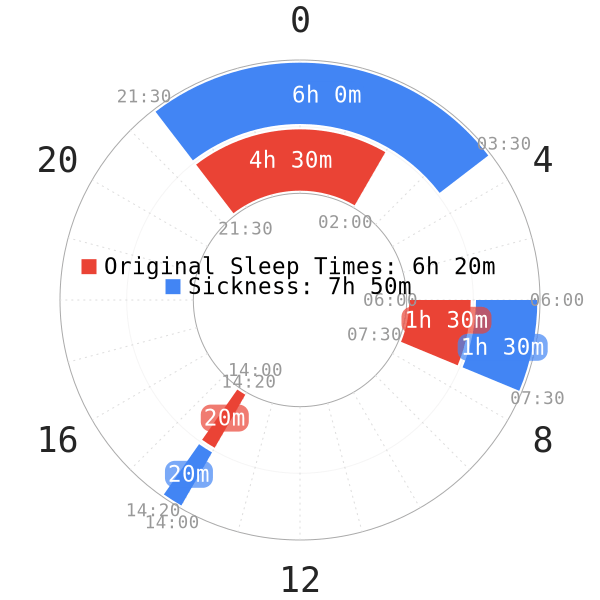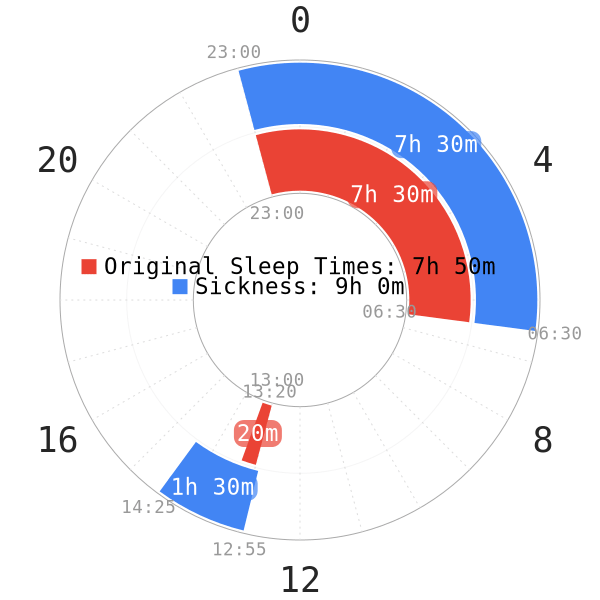Introduction
Having some temporary sickness, such as the flu or a fever, is a normal bodily reaction during sleep deprivation. We know that SWS deprivation can weaken the immune system, leaving the sleeper vulnerable to potentially many symptoms. It is also a natural reaction that the initial changes in sleep habits can make the body uncomfortable; hence, there is an “adaptation” period with a new sleep regime.
In a similar vein, you can also look at “adaptation symptoms” in ketogenic diets when you make a switch from your regular diet for example. This is a good way to understand that an adaptation to a new lifestyle will jump-start certain bodily changes. In this post, we will explore sickness symptoms and how to handle it on a polyphasic schedule during and after the adaptation phase.
Mechanics of Sickness
There are certain ways the body will respond to sickness. However, we will only show how sickness would affect sleep.
- Being sick increases the SWS need significantly; this eventually causes the body to add several sleep cycles and increase the overall sleep need. This is because the need to recover from inflammation and malfunctioned body functions requires additional deep sleep.
- The additional sleep gives the immune system a boost in fighting off your sickness1. If you disrupt your sleep before waking naturally, you will likely have missed out on SWS. Consequently, this hinders recovery and can both prolong the sickness and risk secondary health problems.
Polyphasic Sleep & Sickness
Falling Sick During Adaptation
Whenever a polyphaser is sick, they should switch to a schedule with more sleep. If you get sick during adaptation, it is important to take a break and recover before continuing. Similarly, if you are sick before an adaptation, that is a golden opportunity to completely recover to get a fresh start.
Take note of the following:
- Traditionally, you would need to revert back to monophasic sleeping until you are no longer sick.
- Adding extra cycles in SWS-oriented times to the entrained schedule’s existing sleep blocks is also possible.

- For example, you can extend the first core sleep in a Dual Core or multi-core schedules since this core often favors SWS.
- The second core sleep can remain the same, depending on the sickness symptoms.
- On Everyman schedules, you only need to add an extra cycle (90m) to the core.
- For radical schedules, including nap-only, unfortunately you will have to do a hard reset because of the limited sleep. In addition, extending sleep on these schedules would destabilize them immediately.

- It is also possible to extend existing naps or cores during the time of sickness; however, there should not be a limit on how long you allow yourself to sleep.
- The lesser the total sleep, the more effect on extending naps. As a result, during adaptation, your previous “core sleep habits” can stick. It can then become very difficult to turn it back to the short nap.
- It can be much more challenging to return to the original sleep habits especially if you extend both the core(s) and the nap(s) on your schedule. As a result, you should consider between a full reset and extension of only one sleep block.
Falling Sick After Adaptation
While the adaptation phase is more vulnerable to sustenance, your adapted schedule is more resilient. In fact, it can actually be more resilient than you think. After your body is accustomed to the schedule, it will learn to get vital sleep stages more quickly, thanks to repartitioning. Thus, certain degrees of sickness may not destabilize the whole schedule.
As usual, you may want to take notes of the following tips:
- Keep a tracking log of your sickness. For example, date, time, sleep duration, which core sleep or naps receive extension, sickness duration, and your eating habits.
- If you have an EEG, you may notice that after a while, you start feeling better with some extension(s). As a result, you may see light sleep percentage increase in your core(s) while SWS requirements return to normal. This means your body has fully recovered.
- Similar to the previous section, extending a core sleep or a nap is viable. Indeed, you can still salvage some wake time and your sleep schedule’s structure with this trick.
- Try to return to your original sleep times as soon as you can. However, do not rush the process!
- If you have to extend your schedule for too long (e.g, a couple weeks), you will still lose all your adaptation progress.
Anecdotes From Adapted Sleepers
If you want to handle sickness as fast as possible, you may completely revert to monophasic sleep and then return to your adapted schedule right away. Even though we do not recommend this approach unless you feel like it is necessary, there have been some successful anecdotal reports.
- Aeia, the Uberman sleeper, was able to resume her adapted Uberman after recovering on monophasic sleep for a couple days. She also noted that the re-transition to Uberman was not difficult because she adapted to it before the sickness.
- Meko-Isa, an adapted Everyman 3-extended sleeper in the Discord, was also able to return to her polyphasic schedule after 5 days of monophasic recovery.
How to Fix Regular Sickness Issues
Concerns about Polyphasic Sleep Causing Sickness
Specifically, it is actually far from uncommon that certain polyphasic sleepers keep getting sick while they adapt to a reducing sleep schedule. Thus, a question one may ask is whether polyphasic sleeping even works at all. Because, sleep deprivation is bad and it seems so unnatural to force your body to sleep this way. Etc. etc.
While it is true that prolonged sleep deprivation can become chronic and wreck well-being, things are far from bleak. From many literature sources, it is even possible to perform well on rather restrictive schedules for an extended amount of time. Below are a couple examples:
- The SPAMAYL sailors who won the transatlantic race with ~a couple weeks (or 2 months in one case) survived with only short naps. We also know that sailors are very physically fit and well-prepared.
- Buckminster Fuller was able to adapt to Dymaxion at middle age, and remained healthy on the schedule for ~2 years.
- Puredoxyk was able to recover from sickness using her Everyman schedules.
Thus, the key is not about whether it is possible to adapt to polyphasic sleep; rather, it is about personal lifestyle and what to improve. Most notably, Siesta sleep is even a renown schedule for an adaptation to sickness in humans2. It makes sense that Siesta is a natural sleep pattern against sickness.
Lifestyle adjustment
The most sensible solution is to improve your own health, mentally and physically. Here are some of our recommendations:
Avoiding Sleep Deprivation
Sleep deprivation weakens the immune system2, so it is overall good to avoid it entirely.
- Poor sleep and lifestyle habits (e.g, sleeping too late at night and waking too early) causes sleep debts to accumulate.
- A lot of people notably sleep less during weekdays and a lot more during weekends. This ingrained habit, therefore, makes it insufficient to resolve all sleep deprivation.
- Poor mental health (e.g, depression) also drastically affects sleep and undermines your vital sleep.
Exercising
Starting an exercise regime with incremental increase in workload intensity is great.
- Endurance activities such as running, swimming will increase your immune system’s capability and functioning. In addition, your blood circulation and metabolism will thank them.
- Some levels of strength training to increase or retain your muscle mass are also recommended. This habit is also great to keep you mobile and active during the harsher adaptation stages.
Nutrition
Eat healthier! There are no good polyphasic schedules that bypass or tolerate poor diets!
- Specifically, you may want to increase fiber intake, complex carbohydrates, protein and lower fat intake.
- Trans fat, excessive saturated fat and refined carbs are bad and can affect your vital sleep! See SWS and REM for more information.
- Do not eat at night, or too close to your bedtime!
Motivation and attitude
- Stay motivated and engaged in your hobbies. In the meantime, you may discover new hobbies and find extra motivation to complete more projects.
- Try to relieve stress and anxiety from your own work or living conditions. These disruptors can affect your overall lifestyle on many levels. To prevent this, you can start taking up yoga and meditation for example.
Main authors: Crimson & GeneralNguyen
Last page update: 30 March 2021
Reference
- Imeri L, Opp MR. How (and why) the immune system makes us sleep. N. 2009;10(3):199-210. doi:10.1038/nrn2576. [PubMed]
- Barone, T. L. “Is the Siesta an Adaptation to Disease? : A Cross-Cultural Examination.” Human Nature (Hawthorne, N.Y.), vol. 11, no. 3, 1 Sept. 2000, pp. 233–258, 10.1007/s12110-000-1012-4. [PubMed]
- Mann D. How Sleep Loss Affects Immunity. WebMD. https://www.webmd.com/sleep-disorders/features/immune-system-lack-of-sleep. Published 2018. Accessed October 21, 2018.
